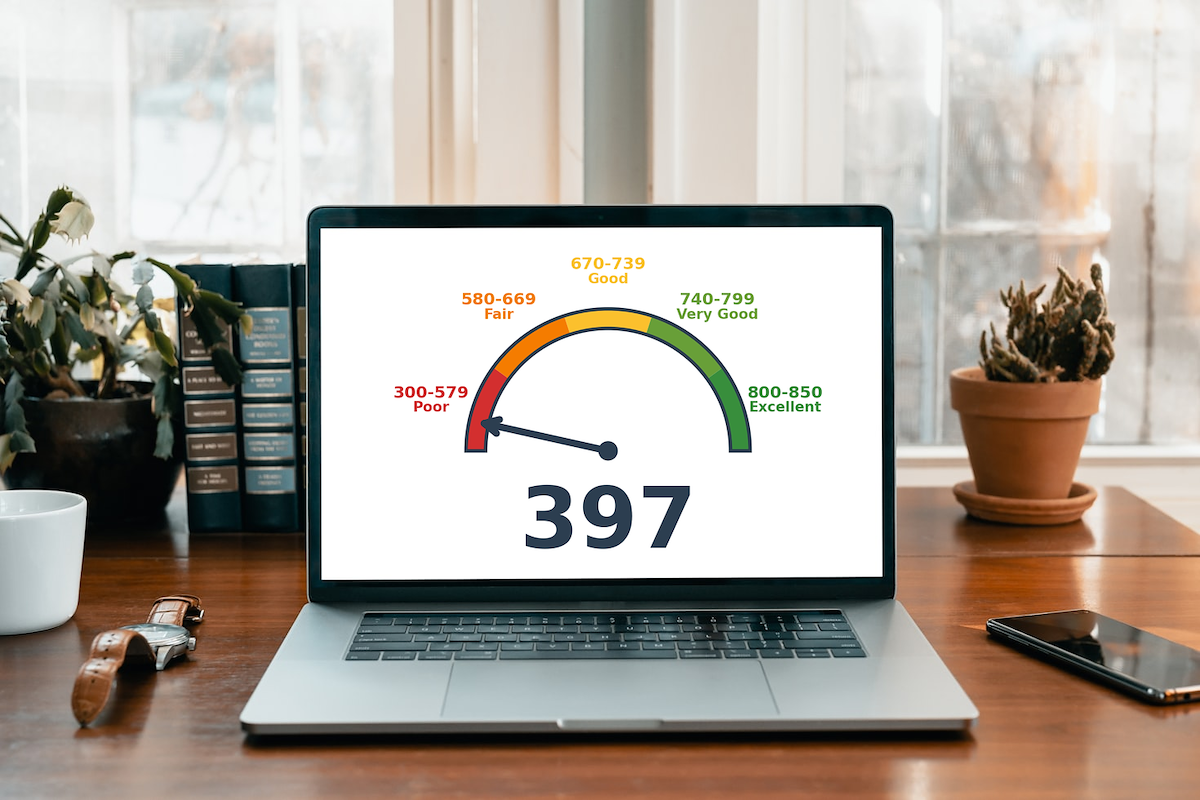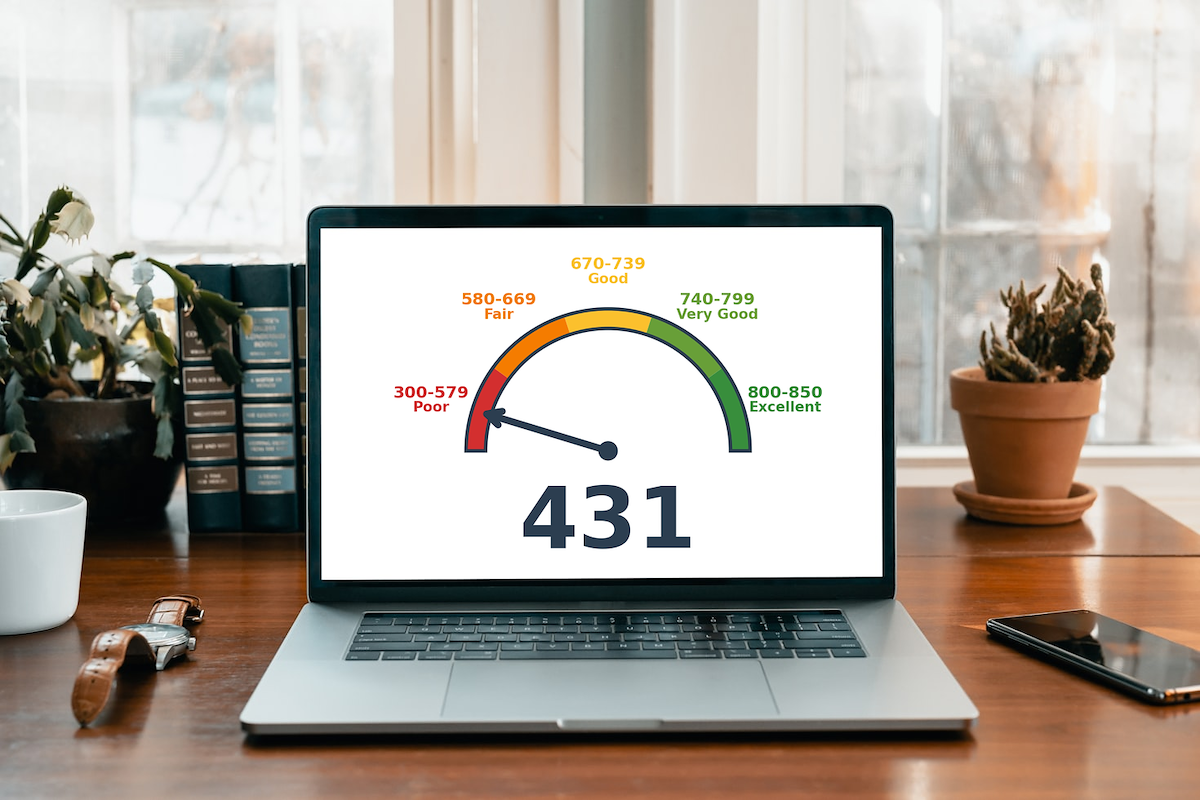
Kudos has partnered with CardRatings and Red Ventures for our coverage of credit card products. Kudos, CardRatings, and Red Ventures may receive a commission from card issuers. Kudos may receive commission from card issuers. Some of the card offers that appear on Kudos are from advertisers and may impact how and where card products appear on the site. Kudos tries to include as many card companies and offers as we are aware of, including offers from issuers that don't pay us, but we may not cover all card companies or all available card offers. You don't have to use our links, but we're grateful when you do!
397 Credit score: What You Need to Know in 2025
July 1, 2025


TL;DR
A 397 credit score indicates there's significant room for improvement, offering a clear opportunity to rebuild your financial standing. This score falls into the 'Poor' FICO® Score range, which typically includes scores from 300 to 579.
What Does a 397 Credit Score Mean?
A credit score of 397 falls squarely into the 'poor' range on the FICO scoring model, which spans from 300 to 850. Lenders view scores below 580 as a sign of very high credit risk. This can create significant financial roadblocks, making it exceptionally difficult to qualify for new credit cards, auto loans, or mortgages. Any credit extended will almost certainly come with steep interest rates and unfavorable terms.
While this score presents immediate challenges, it is not a permanent situation. It provides a clear picture of your current credit health and serves as a baseline from which to move forward. The journey toward a stronger financial future begins with understanding the factors that led to this score, setting the stage for improvement.
Who Has a 397 Credit Score?
While a 397 credit score is well below the average for any demographic, looking at credit scores by age can provide some context. Data shows a clear trend of credit scores increasing as people get older. Here is the average FICO score by generation as of 2023:
- Generation Z (ages 18-26): 680
- Millennials (ages 27-42): 690
- Generation X (ages 43-58): 709
- Baby Boomers (ages 59-77): 745
- Silent Generation (ages 78+): 760
Credit Cards With a 397 Credit Score
A credit score of 397 falls into the "very poor" range, which can significantly hinder your ability to obtain a credit card. Most lenders view such a score as a high risk, meaning you'll likely face rejections for traditional, unsecured credit cards. Your options will generally be limited to products specifically designed for building credit, such as secured credit cards that require a cash deposit.
Kudos can help you find the right card for your situation with its AI-powered Explore Tool, which asks what you're looking for in a card. Based on your preferences, it then sifts through nearly 3,000 options to provide personalized recommendations that align with your financial goals, such as securing a low interest rate.
Auto Loans and a 397 Credit Score
A 397 credit score places you in the deep subprime category, which can make securing an auto loan challenging. While you may still get approved, you will likely face significantly higher interest rates and less favorable loan terms.
According to a 2025 market report, average auto loan rates vary significantly by credit score:
- Super-prime (781-850): 5.25% for new cars, 7.13% for used cars
- Prime (661-780): 6.87% for new cars, 9.36% for used cars
- Non-prime (601-660): 9.83% for new cars, 13.92% for used cars
- Subprime (501-600): 13.18% for new cars, 18.86% for used cars
- Deep subprime (300-500): 15.77% for new cars, 21.55% for used cars
Mortgages at a 397 Credit Score
With a 397 credit score, qualifying for a traditional mortgage is not feasible. Most government-backed programs have minimum score requirements that a 397 score does not meet. For instance, FHA loans require a score of at least 500, and that’s with a 10% down payment. Conventional, VA, and USDA loans also have lender-imposed minimums that are significantly higher, typically starting around 620.
In the rare case you found a specialized subprime lender, a 397 score would lead to very unfavorable terms. You would face extremely high interest rates, a large down payment requirement, and significant fees. Lenders would also subject your finances to intense scrutiny, dramatically increasing the overall cost of the loan and making homeownership much more difficult to afford.
What's in a Credit Score?
Understanding your credit score can feel like trying to solve a complex puzzle, as it's a blend of several key financial habits. The most common factors that determine your score include:
- Your payment history tracks whether you have paid past credit accounts on time.
- Credit utilization is the percentage of your available credit that you are currently using.
- The length of your credit history considers the age of your oldest account and the average age of all your accounts.
- Credit mix refers to the variety of credit products you have, such as credit cards, retail accounts, and loans.
- New credit inquiries and recently opened accounts can also temporarily impact your score.
How to Improve Your 397 Credit Score
Don't be discouraged by a 397 credit score; improving your credit is entirely possible with consistent effort and the right strategy. There are several proven methods you can use to boost your creditworthiness and build a healthier financial profile.
- Monitor your credit reports regularly. This allows you to spot and dispute any errors that could be dragging your score down, which is a common issue for those with very poor credit. Keeping a close eye on your reports also helps you track your progress and stay motivated.
- Establish automatic bill payments. Your payment history is the single most important factor in your credit score, so ensuring every bill is paid on time is crucial. Automating payments prevents missed or late payments, which are especially damaging when you're trying to recover from a very low score.
- Reduce your credit utilization ratio. This ratio measures how much of your available credit you're using, and keeping it low (ideally under 30%) can significantly help your score. For someone with a 397 score, paying down balances or even making multiple payments per month can show lenders you're managing debt responsibly.
- Apply for a secured credit card. If you're struggling to get approved for traditional credit, a secured card is an excellent tool for rebuilding. It allows you to build a positive payment history with responsible use, which is essential for improving a poor credit score over time.
For personalized help managing your cards and maximizing rewards while you build credit, the Kudos browser extension can be a valuable tool.

Supercharge Your Credit Cards
Experience smarter spending with Kudos and unlock more from your credit cards. Earn $20.00 when you sign up for Kudos with "GET20" and make an eligible Kudos Boost purchase.
Editorial Disclosure: Opinions expressed here are those of Kudos alone, not those of any bank, credit card issuer, hotel, airline, or other entity. This content has not been reviewed, approved or otherwise endorsed by any of the entities included within the post.























.webp)
















